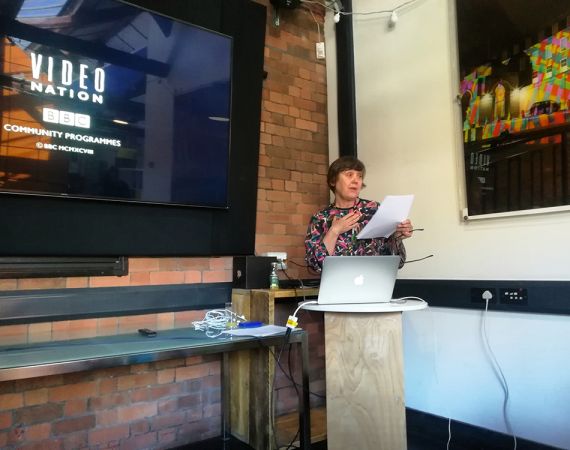Lunchtime talk write-up
Posted on Tue 29 May 2018
Video Nation Revisited
Mandy Rose first joined BBC in 1991. She started working as sound recordist, before going onto produce documentary film and co-found ground-breaking media project Video Nation.

Posted by
Speaker
Mandy Rose
Mandy Rose is Director of UWE Bristol's Digital Cultures Research Centre and Co-Director of i-Docs. She is a member of the PM Studio Executive Board. @CollabDocsMandy Rose first joined BBC in 1991 as a producer/director on The Late Show, an arts magazine programme. She had previously worked in independent film and as a sound recordist, before making her first documentary for C4. In 1993 she moved to the BBC’s Community Programme Unit where, with Chris Mohr, she co-founded and produced the ground-breaking participatory media project, Video Nation. They gave camcorders and training to people around the UK. The programmes they would make were undecided. That would depend on what people shot.
Mandy set the scene by describing how, around 25 years ago, she sat in a BBC office in White City watching one of the first tapes that had arrived in the office. She had no idea what to expect. It began with long shots of mirrors around a house. Then Colonel Gordon Hencher began to speak to camera. He spoke earnestly about mirrors and his growing disdain for them. He describes his contempt of being reminded how much he has aged despite not feeling old inside.
Five Things I Learned from Mandy’s talk:
1. Mirror was the first of 1200 two minute “Shorts” shown on BBC 2 on weekday evenings just before Newsnight between 1994 and 2000. These videos took over the airwaves to show or talk about topics that were important to the people who took part. The team gave 55 cameras out to a diverse group of people and invited them to record their lives over the course of a year. Mandy describes it as Mass Observation fused with Video Diaries - a decade before YouTube.
2. At the start of the project, the team had to develop some principles that would guide them in selecting the people who would take part. They decided to reflect some demographic truths that TV didn’t address eg 50/50 men and women, 20% over 60, while also addressing under-representation eg of BAME people. Mandy described how watching each tape was like opening a lucky bag; the content was often surprising, sometimes contradictory. People didn’t conform to any stereotype.
3. Training was essential for the project to work and involved both teaching participants camera techniques (such as ‘the coconut’, now known as the selfie!) but also advising people in terms of editorial decisions – to film at difficult times, for instance, as well as capturing happy moments. The team edited the material, but the participants had a contractual right of veto, so were always shown content for approval before broadcast, which led to people being very open about what they filmed. Mandy saw the project as a form of collaboration between the BBC team and the participants.
4. The initial audience response to the Video Nation Shorts was fascinating. The BBC “duty log” where caller comments were noted contained a lot of confused and frustrated complaints from viewers who couldn’t quite understand what they were supposed to be watching, some even describing it as lewd and not suitable for television. After a while the complaints petered out. The public seemed to recognise that this was meant to be a kaleidoscopic view of the nation - and perhaps they saw something of themselves in the videos too?
5. Working on Video Nation had a deep impact on Mandy. Personally, she was often very moved by the things people shared, and by the creativity with which they approached making recordings. She’d been unsure about the prospect of being a parent, but witnessing the tenderness among the families who recorded for Video Nation encouraged her to take the plunge. Professionally, it opened her eyes to what might be possible as digital tools enabled the public to get involved in media production, and participatory media has been a key theme in her work ever since. Mandy is now developing a research proposal to revisit Video Nation a quarter century on.
